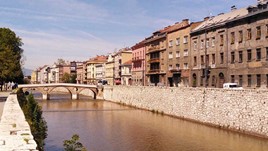
By Helen Glenny
Travel Writer30 Aug 2017 - 5 Minute Read
I closed my book, snapping a hair tie around its edges. He opened his, gently, taking care not to bend the pages. I shoved mine into my bag and clasped it protectively to my chest. He read his with intensity, drawing it into his lap, knees lifted to protect it when anyone passed by, kicking up dust.
My book, picked up at a local store, was stuffed with US $100 bills – flat to appease black market money traders, enough to last me in this place with no ATMs; my food, my transport, my bed. It was my most precious possession, but I knew nothing of a book’s value; he’d risked his life for his.
Kyine. He introduced himself on a quiet, tree-lined street, a cool breeze providing relief from the city’s oppressive heat. Above the treeline of the nearby park, Shwedagon Pagoda’s golden apex gleamed, locating us: Yangon, Myanmar.

I asked him about his book – he pointed out four people reading on street corners, park benches, and at tea stalls. In this country of 53 million, almost all are literate, an impressive feat in the third world.
But its people couldn’t always read freely, he told me. Twenty years ago, isolated from the outside world by a military dictatorship, Myanmar’s libraries were empty.
In this country of fervent readers, there were no books.
Kyine was at university then. Cut off from international academia, he was frustrated. Underserved. His friends felt it too. They joined thousands of restless, angry Burmese surging, over months, into protest. Under the golden glint of Shwedagon Pagoda the protestors gathered. Face-to-face with armed military men, Kyine knelt to show his vulnerability and gain their trust. The soldiers shouted with the reckless energy of men who believe that they’re in control, they’re beyond retribution, and they’re in the right.
Amid the peaceful protest, the soldiers opened fire.
Kyine talked about the massacre with detachment, his voice breaking only when he told me what happened days after, when soldiers raided a local hospital, shooting nurses tending to the wounded.
Kyine sat forward, feeling the weight of the book in his hand. It had been two months since Myanmar’s first democratic election in his lifetime. With vigor, books had reappeared on shelves, publishers had opened on street corners, and students now talked literature over sweet tea.
Clutching my bag, I left Kyine to his reading. Though I knew exactly how many $100 bills lay flat within my precious book, only now was I beginning to appreciate its worth.
Discover similar stories in
transformation
Travel Writer
Originally from New Zealand, now living and working in Brighton, UK, Helen was a 2017 World Nomads Travel Writing Scholarship Winner.


No Comments